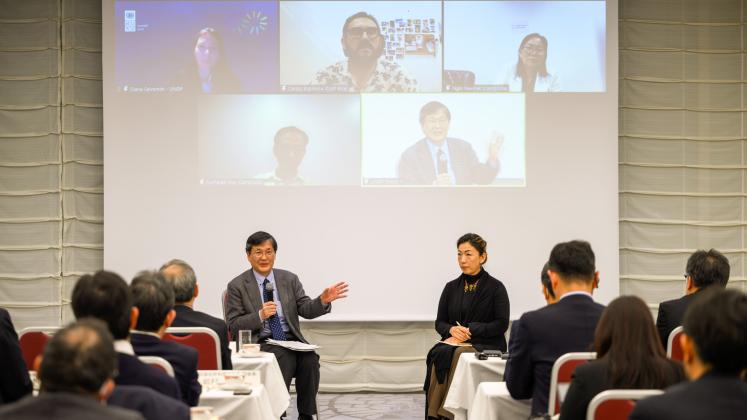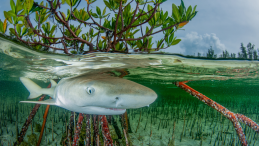On 13 February 2024, Tsunao Watanabe (Senior Programme Coordinator, UNU-IAS) delivered a keynote presentation on Community Development and Knowledge Management for the Satoyama Initiative (COMDEKS) — which promotes sustainable use of biodiversity and natural resources through small grants. The presentation was part of an event discussing past and future COMDEKS projects delivered under the Global Environment Facility Small Grants Programme (GEF-SGP), with participants including members of the Keidanren Committee for Nature Conservation (KCNC) and donor companies. It was organized by KCNC, UNDP and the Ministry of the Environment of Japan (MOEJ).
Opening the event, Keiji Nishizawa (President, KCNC) underscored the crucial role of the business sector in bolstering financial support for NGOs and local communities in the face of the interconnected crises of climate change and biodiversity loss. Yutaka Matsuzawa (Vice-Minister for Global Environmental Affairs, MOEJ) emphasized the commitment of Japan to the Kunming–Montreal Global Biodiversity Framework (GBF) through the Satoyama Initiative and COMDEKS. In 2022, MOEJ and KCNC announced the provision of JPY 700 million and JPY 300 million respectively over the next six years to fund phase four of the programme.
Dr. Watanabe introduced the International Partnership for the Satoyama Initiative (IPSI), a global partnership working to realize societies in harmony with nature, whose secretariat is hosted by UNU-IAS. COMDEKS is a flagship programme of IPSI that finances small-scale projects in local communities, facilitating knowledge sharing and capacity development among stakeholders. Since its inception the programme has supported projects in 20 developing countries.
Akiko Yamamoto (Regional Team Leader, UNDP) emphasized the intrinsic link between socio-economic development and environmental protection, advocating for investment in nature's healing power to secure a sustainable future. She introduced the UNDP Nature Pledge, which places nature at the heart of development to provide a planetary safety net for all of humanity.
A panel discussion showcased COMDEKS projects in Cambodia and Costa Rica, highlighting their transformative impact and lessons learned. Notable improvements included enhanced benefit-sharing mechanisms across communities and tangible benefits derived from nature conservation efforts. The discussion underscored the importance of stakeholder collaboration, with COMDEKS serving as a vital platform for networking and collective action.
Shinobu Yume Yamaguchi (Director, UNU-IAS) noted that COMDEKS played a pivotal role in achieving the targets set out in the GBF, particularly in reducing biodiversity loss through community-driven planning (Target 1); conserving lands and seas with community involvement (Target 3); and promoting sustainable practices in agriculture and forestry (Target 10).



